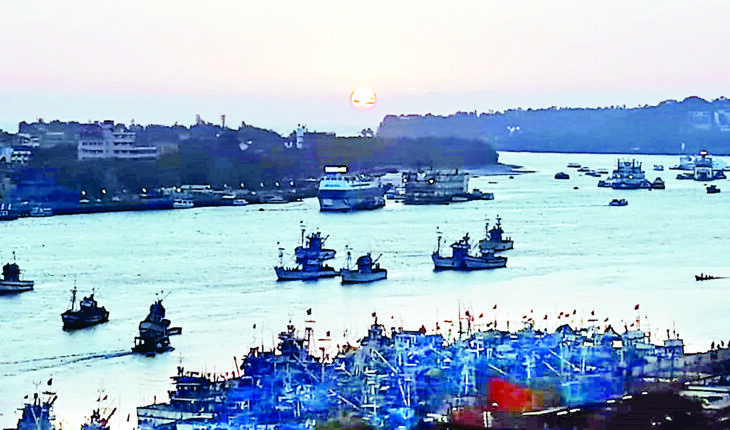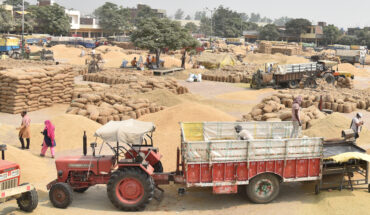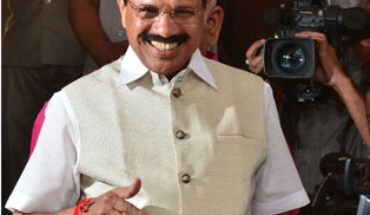Dominick Rodrigues
Visakhapatnam: Vice President M. Venkaiah Naidu highlighted Covid-19 as a probable game-changer for India’s fisheries sector and the country’s Blue Revolution in the wake of the pandemic causing the population to adopt healthy dietary habits. “The production of snapper seed technology will give a fillip to diversification of mariculture in India,” he said while addressing scientists and staff at the Central Marine Fisheries Research Institute (CMFRI) and Central Institute of Fisheries Technology (CIFT) in Visakhapatnam recently.
Describing fish as a great source of protein and the key for reducing malnutrition in the country, especially in children, Naidu urged health experts and nutritionists to for awareness among the people about the many benefits of fish diet since fish is rich in omega-3 fatty acids – that are necessary for body and cardiovascular health. “India is blessed with vast aquatic resources from the pristine waters of the Himalayas to a long coastline of over 8000 kms that is endowed with a diversity of fish fauna supporting millions of people’s livelihoods over many generations,” he said.
“The government has revitalized the concept of Blue Revolution with an aim to overhaul and rejuvenate the fisheries sector. The core idea is to make ‘Blue Economy’ a vibrant component of our growth engine. The Pradhan Mantri Matsya Sampada Yojana (PMMSY) seeks to enhance fish production to 22 million metric tons by 2024-25.”
While India ranks second in global fish production with annual fish production of 13.75 million metric tons (MMT) in 2018-19 with inland fisheries sector contributing nearly 70 percent and remaining from the marine sector, total fisheries potential of India has been estimated at more than 22 million metric tonnes. “India should aspire to become number one in export of fish as much potential remained to be harnessed in both inland and marine fisheries in the country from where – from a modest start of being a small scale industry — fisheries have expanded as a very important socio-economic force over the past few decades and currently provides employment to nearly 15 million people on the Indian coast,” he said, adding that India is the 4th largest exporter of fish in the world with the sector being one of the major contributors of foreign exchange earnings amidst growing population and increasing demand for animal protein, besides domestic requirement of fish estimated to increase significantly.
Reiterating the need for bridging the gap in demand and supply of Indian annual fish production, the Vice-President observed that capture fisheries and deep-sea fishing alone could not meet the demand for which thriving marine fish culture is the way forward. “With over 8000 km of coastline having immense potential for mariculture development, cage farming is widely recognized as the most important technology for increasing fish production,” he said while lauding CMFRI and CIFT for their contribution in this regard.
While lack of availability of quality fish seed has been a major concern over the years, efforts by research institutes mitigated this problem to an appreciable extent, though there is still huge scope for innovation in this area and need to improve value-addition to fish stocks by maintaining the highest quality, consistency and reliability through by better-grading, quality assurance and packaging of related products, Naidu said in calling for Indian mariculture’s diversification through investing in innovative products such as nutraceuticals and ornamental fish. “Finally, we need to focus on reducing post-harvest losses by creating the required infrastructure like cold storage, besides municipal bodies special creating clean and attractive fish markets,” he said.
Visakhapatnam: Vice President M. Venkaiah Naidu highlighted Covid-19 as a probable game-changer for India’s fisheries sector and the country’s Blue Revolution in the wake of the pandemic causing the population to adopt healthy dietary habits. “The production of snapper seed technology will give a fillip to diversification of mariculture in India,” he said while addressing scientists and staff at the Central Marine Fisheries Research Institute (CMFRI) and Central Institute of Fisheries Technology (CIFT) in Visakhapatnam recently.
Describing fish as a great source of protein and the key for reducing malnutrition in the country, especially in children, Naidu urged health experts and nutritionists to for awareness among the people about the many benefits of fish diet since fish is rich in omega-3 fatty acids – that are necessary for body and cardiovascular health. “India is blessed with vast aquatic resources from the pristine waters of the Himalayas to a long coastline of over 8000 kms that is endowed with a diversity of fish fauna supporting millions of people’s livelihoods over many generations,” he said.
“The government has revitalized the concept of Blue Revolution with an aim to overhaul and rejuvenate the fisheries sector. The core idea is to make ‘Blue Economy’ a vibrant component of our growth engine. The Pradhan Mantri Matsya Sampada Yojana (PMMSY) seeks to enhance fish production to 22 million metric tons by 2024-25.”
While India ranks second in global fish production with annual fish production of 13.75 million metric tons (MMT) in 2018-19 with inland fisheries sector contributing nearly 70 percent and remaining from the marine sector, total fisheries potential of India has been estimated at more than 22 million metric tonnes. “India should aspire to become number one in export of fish as much potential remained to be harnessed in both inland and marine fisheries in the country from where – from a modest start of being a small scale industry — fisheries have expanded as a very important socio-economic force over the past few decades and currently provides employment to nearly 15 million people on the Indian coast,” he said, adding that India is the 4th largest exporter of fish in the world with the sector being one of the major contributors of foreign exchange earnings amidst growing population and increasing demand for animal protein, besides domestic requirement of fish estimated to increase significantly.
Reiterating the need for bridging the gap in demand and supply of Indian annual fish production, the Vice-President observed that capture fisheries and deep-sea fishing alone could not meet the demand for which thriving marine fish culture is the way forward. “With over 8000 km of coastline having immense potential for mariculture development, cage farming is widely recognized as the most important technology for increasing fish production,” he said while lauding CMFRI and CIFT for their contribution in this regard.
While lack of availability of quality fish seed has been a major concern over the years, efforts by research institutes mitigated this problem to an appreciable extent, though there is still huge scope for innovation in this area and need to improve value-addition to fish stocks by maintaining the highest quality, consistency and reliability through by better-grading, quality assurance and packaging of related products, Naidu said in calling for Indian mariculture’s diversification through investing in innovative products such as nutraceuticals and ornamental fish. “Finally, we need to focus on reducing post-harvest losses by creating the required infrastructure like cold storage, besides municipal bodies special creating clean and attractive fish markets,” he said.






